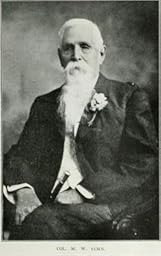I got onto
Linda Barnickel's MILLIKEN'S BEND: A CIVIL WAR BATTLE IN HISTORY AND MEMORY (2013) (Amazon Prime, one-click, two-day) in a roundabout way, by transcribing an 1850s
letter to my GGG Grandfather Absalom Sims from his nephew John Randolph Sims,
whom I soon identified [instant knowledge by way of Google] as the brother of
a character in a book I did not know MILLIKEN'S BEND--M. W. Sims, a
Confederate major accused of speakable crimes (the murder of two captured
Federal officers) and unspeakable crimes (the murder of four [black?]
ministers, each dragged from bed [presumably 4 separate beds]).
Sims is a
major character in Barnickel's comprehensive story. To her great credit,
Barnickel does not say that Milton Walker Sims was guilty of the charges
alleged against him. She generously responded to my emails with a copy of a
document which lists a source she did not find and one I have not yet been
able to find, an account by Sims of his escape from Federal custody published
in the New Orleans Picayune in an indefinite number of years after the War. I
go back to the decades when looking at the only available microfilm of the
Picayune was like reading a pale page through buttermilk and the Tulane hard
copy was too precious for a visitor from Delaware to see, even one who had
been Agent-Telegrapher on the KCS RR in Singer and other Sabine River towns
in the 1950s. We will presumably find this document.
But in looking for it
last night I found a full page seven column essay by Charles L. Martin in the
Galveston Daily News for May 20, 1895, "Sentenced to Be Hanged." This
is a very powerful article and I must say that reading it just before bedtime
instead of watching the Oscars may not have been a good idea. It is
upsetting. In one passage Sims, in solitary confinement, ransacks his brain
"as to the probable charges against him." He decides it must have
to do with four slaves "who had enlisted in the federal army and were
caught with arms in their hands making war upon the white people." Sims
"was ordered to send two of them to Delhi and have them hanged in the presence
of the troops there and the other two to hang in the presence of the troops
at Floyd, where he was stationed. This order he executed. He simply obeyed
orders." Obviously, this newspaper article from 1895, as well as the
elusive Picayune article, ought to have gone into Barnickel's book, whatever
use she would have made of it. You can't blame her for skimping on research,
but you do need to recognize that research really has been transformed in the
last decade and a half and is being further transformed even as I type this.
In particular, databases of newspapers are transforming what we can learn
about American history. Historians still ignore major sources. I am not
talking about Barnickel now, but, for instance, the Revolutionary War
historians who in the last half decade have not made much use of the great
searchable Internet site of the Southern Campaigns pension applications under
the 1832 law. Information is exploding around us. I love printed and bound
books. But I understand the appeal of an instantly revisable online text.
So: I began looking a few days ago as part of my work on ORNERY PEOPLE: WHAT WERE THE DEPRESSION OKIES? Who was this John Randolph Sims writing to Grandpa Sims in Pope County Arkansas? What I find here is that Cousin Milton (Milton Walker Sims) was a man who lived a remarkable life, not all of which has yet been told. My God, what a story! Barnickel 121: "After jumping into the river [from a steamboat, knowing he was about to be executed] and swimming to shore, Sims hid in the swamplands, 'wandering for weeks, with no food but roots and berries.' Wending his way westward through northern Louisiana, Sims at last arrived at Hebert's [visualize the acute accent and say the name the way we do in Louisiana, A-bare] camp. 'He was a man considerably over six feet tall and finely proportioned,' Hebert recalled, 'but on his return. he was so gaunt haggard and emaciated that no one recognised him.' Despite his hardships, there was also good-natured laughter at his expense. Sims entered the camp wearing a suit made out of 'Calico window curtains . . . of a very gaudy and striking pattern' provided to him by a kindly woman he met somewhere along the way." Very strangely, Cousin Milton's accused partner in crime in Barnickel's book, Jesse W. Sparks, is also a cousin of mine (not a cousin of Milton's as far as I know), the grandson of the Revolutionary Sparks who made his way from western North Carolina to Nacodoches, Texas. I already knew about the grandfather's adventures (the Tories robbed them of pewter--they having no Delft) but not Jesse's, who toward the end of his life spectacularly saved several dozen negroes from death in Mexico. What is the likelihood of encountering this pairing in a new book on a neglected battle, MILLIKEN'S BEND? Stories, stories. Cousin Milton's is not yet fully told, but Barnickel has opened up a history as interesting as that in GLORY.  |
"That truth should be silent I had almost forgot"--Enobarbus in ANTONY AND CLEOPATRA, back in Rome after having been too long in Egypt.--------- Melville's PIERRE, Book 4, chapter 5: "Something ever comes of all persistent inquiry; we are not so continually curious for nothing."
Monday, February 23, 2015
Cousin Milton's Amazing Adventures Told by Linda Barnickel (2013) and Charles L. Martin (1895)
Subscribe to:
Post Comments (Atom)
No comments:
Post a Comment